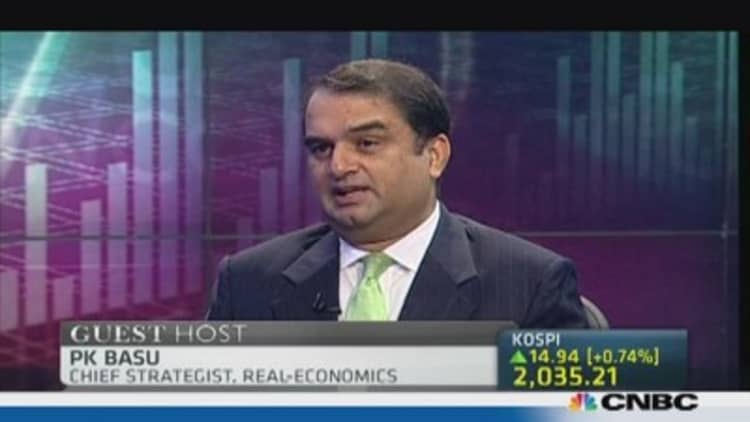China's foreign exchange reserves saw their biggest quarterly increase since the second quarter of 2011, with experts noting that affairs in the U.S. are complicating China's constant need to wrestle control of its currency.
The country's stash of foreign exchange reserves rose to $3.66 trillion in the three months to the end of September, from $3.5 trillion in the three-month period ending in June. This $160 billion jump signals central bank intervention aimed at slowing gains in the yuan, which is currently trading at record highs against the dollar.
"This was the fifth largest quarterly increase on record," Simon Derrick, the chief currency strategist at Bank of New York Mellon told CNBC. "In other words, this was a return to the sort of conditions that prevailed during the height of the currency war in late 2010/early 2011."
(Read more: Yuan moves one step closer to global currency status)
Manipulating reserve levels can enable a country's central bank to intervene against currency fluctuations. Along with altering benchmark interest rates and quantitative easing there have been ongoing discussions in the last few years that countries are purposefully debasing their own countries to improve competitiveness - a concern that has been given the moniker "currency wars".

Wei Yao, a currency strategist at Societe Generale believes that that the People's Bank of China (PBoC) is again left with a difficult decision: should it sterilize inflows with this sort of manipulation or allow the yuan to appreciate? With China's export growth fizzling in September to post a surprise fall, Yao it looks like the PBoC opted for the former.
"Looking at the central bank's balance sheet data, we notice that the PBoC has significantly stepped up currency intervention since August," she said in a research note on Tuesday. "We expect the central bank to keep the USD/yuan rate largely stable around the current level until the end of the year, in order to alleviate the pain inflicted on the export sector."
(Read more: China central bank underlines reform push with record yuan despite weak exports)
Meanwhile, Derrick is sympathetic for China if the PBoC, which is being frustrated by the U.S. Federal Reserve's monetary policy. After concerns the Fed would moderate its asset-purchase program sparked an emerging market sell-off earlier in the year, flows back to the dollar have reversed in recent months as the U.S. central bank held off on "tapering" its asset purchases.
"As (the PBoC) intervened to soak up these inflows the authorities have likely ended up recycling a substantial proportion of these fresh reserves back into dollar deposits and U.S. government and quasi government securities," he said.
"However, having done so they now find politicians in Washington flirting with the possibility of a default."
The only practicable way that China can break this cycle in the foreseeable future is for it to liberalize its currency regime, Derrick said. A reform that China seems to be heading for, with the country launching a currency swap deal with the euro zone last week and an announcement on Tuesday that it will open up its capital markets for British-based investors.
— CNBC.com's Matt Clinch. Follow him on Twitter @mattclinch81


